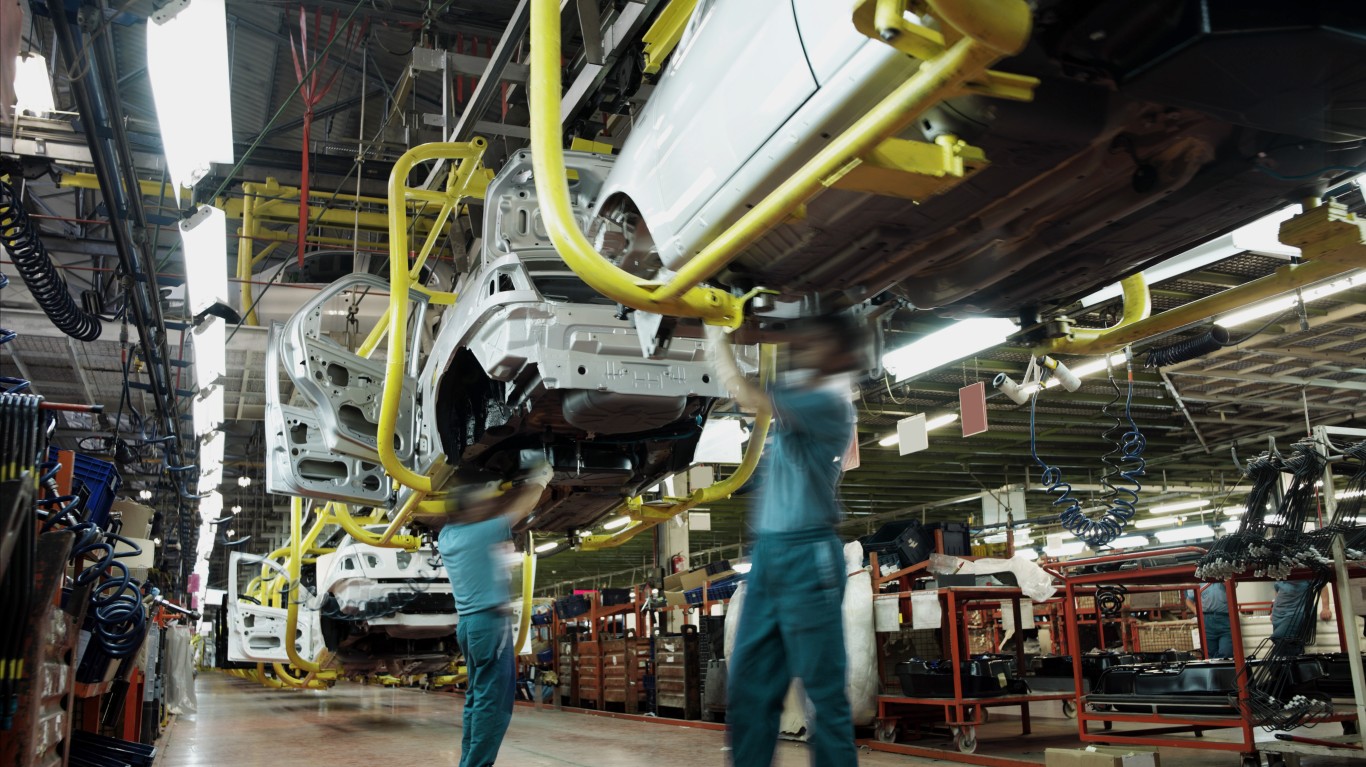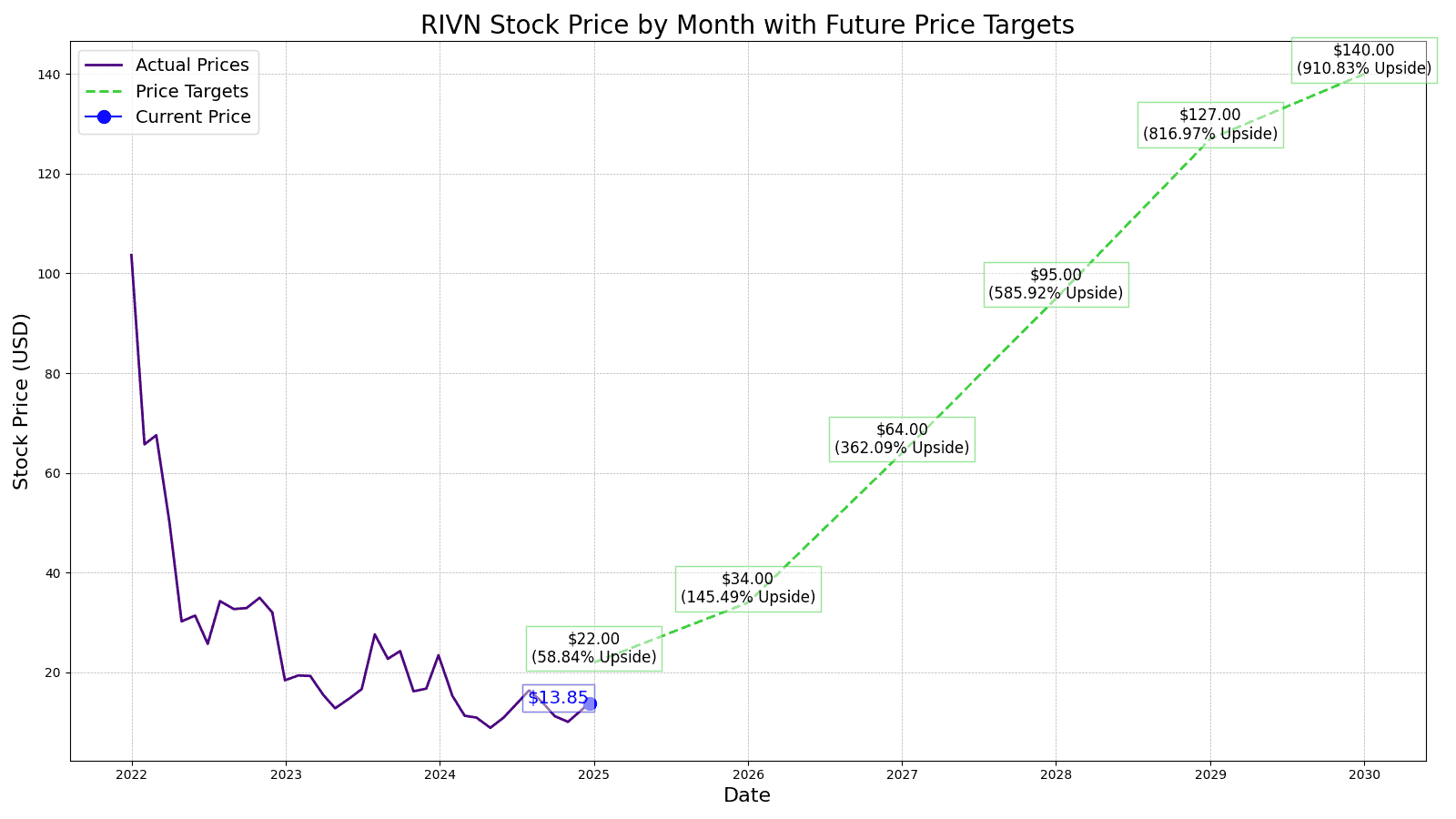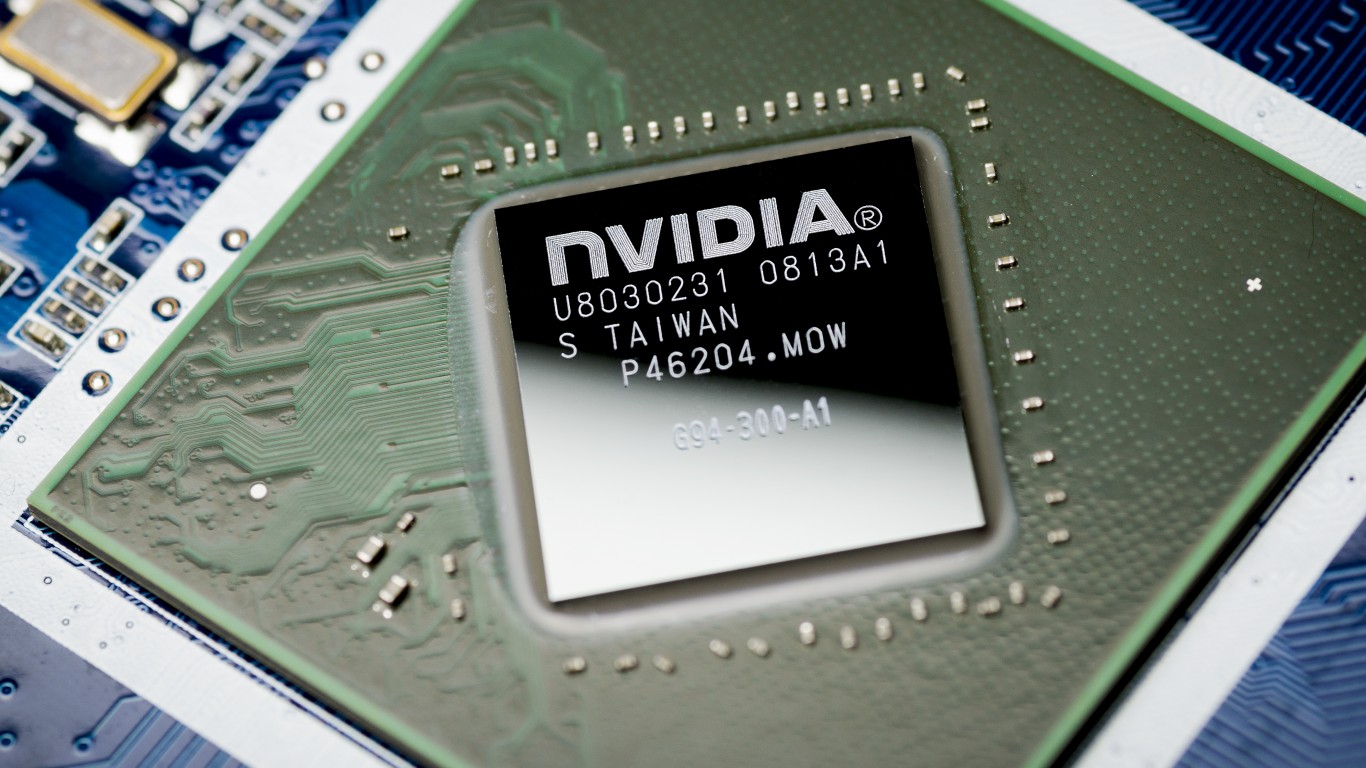
Electric vehicle maker Rivian Automotive (NASDAQ: RIVN) IPO’ed in November 2021 and immediately made a splash with its stock price skyrocketing to $180 in just its first week of trading.
The cash infusion was a much-needed lifeline for Rivian, with $3.7 billion in operating expenses in 2021 and only delivering 920 vehicles. The company also had backers in Amazon (NASDAQ: AMZN) and Ford (NYSE:F), who held 260 million shares of Rivian collectively at IPO.
But as the COVID lockdown investing frenzy died out, it left an SUV-sized hole in Rivian’s stock price, currently trading for $13.85 per share, down 82.24% since its IPO 3 years earlier.
24/7 Wall Street aims to provide readers with our assumptions about the stock prospects going forward, what growth we see in Rivian for the next several years, and what our best estimates are for Rivian’s stock price each year through 2030.
Key Points in this Article:
- Key growth drivers include cost reduction in EV components and increased production capacity, targeting profitability by 2027.
- Rivian aims to cut material costs by 45% with the introduction of its Gen 2 platform by 2026.
- If you’re looking for a megatrend with massive potential, make sure to grab a complimentary copy of our “The Next NVIDIA” report. The report includes a complete industry map of AI investments that includes many small caps.

Recent Rivian Stock Updates and News
12/16/2024
In 2025, Rivian’s new AI-powered voice assistant will be available. The company’s Chief Software Officer, Wassym Bensaid, recently released plans for Rivian’s new AI-powered voice assistant, which will be introduced in 2025. This new voice assistant will be able to do much more than simply follow simple voice commands. Leveraging AI, the system aims to process multiple instructions simultaneously and under user requests’ underlying intent.
12/9/2024
Rivian’s shares jumped over 13% today after Benchmark’s updated “Buy” rating. Benchmark set a price target of $18, citing strong industry partnerships and a strong financial position as key drivers for Rivian’s future growth.
12/3/2024
Volkswagen’s upcoming Golf will be the first to benefit from the company’s new partnership with Rivian.
11/25/2024
Rivian’s shares are rising following reports from Bloomberg, which suggest a potential settlement between Tesla and Rivian. Tesla had previously filed a lawsuit against Rivian, alleging that the EV startup had poached employees to steal sensitive information.
11/18/2024
Volkswagon announced that it will increase its investment in Rivian, leading to a rise in Rivian’s stock today.
11/11/2024
Investment firm Stifel has adjusted its price target for Rivian from $18.00 to $16.00 today. However, the firm maintains a “Buy” rating on the stock. Rivian’s stock price rose 1.9% today, trading as high as $10.80.
11/8/2024
Rivian suffered through a tough third quarter due to supply chain issues, as seen in the company’s recent Q3 earnings report. Even though Rivian managed to produce and deliver a significant number of vehicles, the high costs and low revenue led to a loss of nearly $30,000 per vehicle.
Life and Business are Not Easy For an Automotive Start-Up
The following is a table of Rivian’s revenues, operating income, and share price for the first few years as a public company.
Here’s a table summarizing performance in share price, revenues, and profits (net income) from 2014 to 2018.
| Share Price (End of Year) |
Revenues | Operating Income | |
| 2021 | $50.24 | $55.0 | ($4,220.0) |
| 2022 | $19.30 | $1,658.0 | ($6,856.0) |
| 2023 | $10.70 | $4,434.0 | ($5,739.0) |
| TTM | $15.35 | $4,997.0 | (5,790.0) |
Revenue and net income in $millions
Now let’s take a look at Tesla in the first few years it manufactured and sold the Model S (the official launch of the Model S was June 22, 2012).
| Share Price (End of Year) |
Revenues | Operating Income | |
| 2011 | $2.24 | $204.2 | ($251.5) |
| 2012 | $2.25 | $413.3 | ($394.3) |
| 2013 | $16.87 | $2,013.5 | ($61.3) |
| 2014 | $13.81 | $3,198.4 | ($186.7) |
While revenue growth for both firms after launching their first mass-market vehicles is similar, Tesla’s operating expenses were much more favorable, particularly around SG&A and R&D expenses.
Elon Musk, Tesla’s CEO, has always been a proponent of word-of-mouth marketing and a hawkish approach to minimizing product costs, allowing his company to stay afloat while moving to new lines of automobiles.
The biggest question facing Rivian investors today is, can they lower costs, and when will positive net income be realized?

Key Drivers of Rivian’s Future Stock Performance
- EV Technology and Cost Curves: Rivian’s next generation (G2) R1 vehicles are designed for performance upgrades while at the same time reducing component costs. For example, the number of electronic components will be reduced by 60%, over 60 parts will be eliminated, the compact motor will be redesigned, and close to 2000 connections or welds will be removed. These changes alone are expected to drop materials costs by 20% and speed up the assembly line by 30%. Looking into the back half of 2026, Rivian sees a material cost reduction of 45% for the R2 line of vehicles. Rivian is also investing in enhanced advanced driver assistance systems with improved cameras, radar, and NVIDIA-powered computing power, creating highway assist and 360-degree visibility.
- Electric Vehicle Demand and Incentives: Rivian is currently delivering around 13 thousand vehicles per quarter, which is above analyst estimates, and producing 9 thousand new G2 vehicles per quarter, which keeps it on pace to produce 57,000 units in 2024. The total plant capacity is 215,000 vehicles with expansion plans of 400,000 additional vehicles in Georgia.
- Management’s Path to Profits: Rivian also expects profitability from the R1 platform through premium configurations and scale benefits. The company targets positive adjusted EBITDA by 2027, with long-term goals of 25% gross margin, high teens adjusted EBITDA margin, and 10% FCF margin
- Material cost Reduction: The introduction of the Gen 2 platform and commercial cost downs are expected to reduce material costs by ~20%.
- Fixed Cost Reduction: Improved labor and overhead costs, reduced depreciation, and lower LCNRV charges due to a 30% increase in production line rate and design changes.
- Increased Revenue from Credits: Strong demand for regulatory credits, with over $200 million contracted for FY24.

Rivian (RIVN) Stock vs. Tesla Stock: Why Rivian Receives Different Treatment
Taking a historic look at pricing Rivian stock would start by comparing the sales multiples Tesla received in 2012 to 2015 when the Model S scaled. Tesla was feeling the weight of expansion and keeping its debt load manageable and the market-priced Tesla stock was close to 10x sales.
While Rivian is in a similar situation, albeit with more debt and higher expanses, the market is only valuing the stock at under 3 times sales. Let’s take a look at why that is the case.
- Market Position and Brand Recognition:
- Tesla: By 2011-2015, Tesla had already established itself as a leading innovator in the electric vehicle (EV) market, with significant brand recognition and a first-mover advantage.
- Rivian: Rivian is relatively new to the market and still building its brand and market position.
- Production and Sales Volumes:
- Tesla: From 2011-2015, Tesla ramped up production and sales, particularly with the Model S, which was gaining popularity and market traction.
- Rivian: Rivian is still in the early stages of production, with limited sales volumes compared to Tesla’s growth phase.
- Investor Expectations and Sentiment:
- Tesla: Investors had high expectations for Tesla’s future growth and disruptive potential in the auto industry, leading to higher valuation multiples.
- Rivian: While Rivian has potential, it has not yet demonstrated the same level of market disruption or growth trajectory that Tesla did during its comparable early years.
- Competitive Landscape:
- Tesla: Had fewer direct competitors in the EV space during its early years, allowing for a larger market share and higher investor confidence.
- Rivian: Faces more competition from established automakers entering the EV market and other new entrants, impacting its relative valuation.
Rivian(RIVN) Stock Forecast Through 2030
| Year | Revenue | Shares Outstanding | P/S Est. |
| 2025 | $6,680.64 | 978 mm | 2x |
| 2026 | $10,675.45 | 978 mm | 2x |
| 2027 | $16,491.69 | 978 mm | 2.5x |
| 2028 | $25,124.38 | 978 mm | 2.5x |
| 2029 | $37,538.90 | 978 mm | 2.5x |
| 2030 | $49,394.84 | 978 mm | 2.75x |
Revenue in $millions
Rivian Share Price Estimates 2025-2030

How Rivian’s Next 5 Years Could Play Out
Wall Street analysts have Rivian’s stock price over the next year to be $17.00 which gives the stock a 22.74% upside over today’s price. Of the 28 analysts covering the stock, the consensus recommendation is a 2.1 ‘Outperform’ Score.
We expect to see strong revenue growth of 60% for 2025 and a price-to-sales multiple of 2x, which puts our price target at $21.82.
Going into 2026, we estimate the price to be $33.72, with another strong 50%+ revenue bump. However, with EBITDA still well in the negative, we see the market not rewarding the stock as much and giving it a lower valuation multiple.
Heading into 2027, we expect the stock price increase to leap forward to $64.30 with another strong 50%+ revenue growth year-over-year. That is a 97% year-over-year gain and up 364.26% from today’s stock price.
When predicting more than 3 years out, we expect Rivian’s P/S ratio in 2028 to be 2.5x and top line growth of 50%. In 2028, we have Rivian’s revenue coming in around $25 billion, suggesting a stock price estimate at $95.00 or a gain of 585.92% over the current stock price.
24/7 Wall Street expects Rivian’s stock to continue its revenue growth and to generate $37 billion in revenue. The stock price in 2029 is estimated at $127.00, or a gain of 816.97% over today’s price.
Rivian Stocks Price Target for 2030
We estimate Rivian’s stock price to be $140.00 per share. Our estimated stock price will be 910.83% higher than the current stock price of $13.85.
| Year | Price Target | % Change From Current Price |
| 2024 | $17.51 | Upside of 70.25% |
| 2025 | $22.00 | Upside of 113.90% |
| 2026 | $34.00 | Upside of 230.58% |
| 2027 | $64.00 | Upside of 522.27% |
| 2028 | $95.00 | Upside of 823.68% |
| 2029 | $127.00 | Upside of 1134.81% |
| 2030 | $140.00 | Upside of 1261.21% |
Take This Retirement Quiz To Get Matched With An Advisor Now (Sponsored)
Are you ready for retirement? Planning for retirement can be overwhelming, that’s why it could be a good idea to speak to a fiduciary financial advisor about your goals today.
Start by taking this retirement quiz right here from SmartAsset that will match you with up to 3 financial advisors that serve your area and beyond in 5 minutes. Smart Asset is now matching over 50,000 people a month.
Click here now to get started.
Thank you for reading! Have some feedback for us?
Contact the 24/7 Wall St. editorial team.



